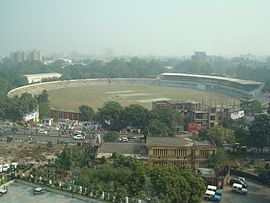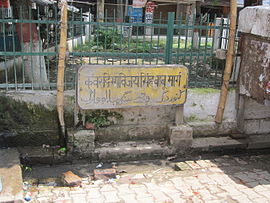K. D. Singh
| Personal information | |||||||||||||||||
|---|---|---|---|---|---|---|---|---|---|---|---|---|---|---|---|---|---|
| Born | 2 February 1922 Barabanki, United Provinces, British India | ||||||||||||||||
| Died | 27 March 1978 (aged 56) Lucknow, Uttar Pradesh, India | ||||||||||||||||
| Sport | |||||||||||||||||
| Position | Inside Right | ||||||||||||||||
Medal record
| |||||||||||||||||
Kunwar Digvijay Singh (2 February 1922 – 27 March 1978), popularly known as "Babu", was an Indian field hockey player. He was born in Barabanki, Uttar Pradesh. He is widely known for his mesmerising passing ability and is considered by many to be the greatest dribbler of the game comparable only to Dhyan Chand.[1]
Education[edit]
He received his early education at the Government High School, Barabanki and Kanyakubj Inter College, Lucknow.[2]
Career[edit]
Early life[edit]
K.D. Singh made his foray into active Hockey with a tournament played at Dewa Mela, and in the year 1937 represented his College Hockey team in an Inter-College tournament. At a young age of 15 years he played for the LYA Club, Lucknow at the Trades Cup in Delhi. In the same Traders Cup, the young team of Lucknow met with a reputed Delhi team, for which Olympic player Mohammed Hussain also played. K. D Singh was not told that Olympian Hussain is also playing in the rival team so that he could play his natural game. The wizard of the hockey kept Hussain pressing and dodging during the entire match. Hussain was also surprised by the sports skills of this young boy. After the match, Hussain said that this boy will one day become one of the greatest players of the Field Hockey. He played for the Hockey team of Uttar Pradesh in all the National tournaments continuously from 1939 to 1959.
As a player[edit]
He was first selected to the All India Hockey Team in 1946-47 for the tour to Afghanistan. After that there was no looking back and he rose quickly to be one of the deadliest forward the hockey world has known. In 1947, while playing alongside Dhyan Chand during the East Africa tour he outscored the wizard by netting 70 goals while the wizard got 62. Even before he was selected as Vice Captain of 1948 Olympic team he was being compared to Dhyan Chand. He played in the capacity of vice-captain in the 1948 Olympic Games. The Indian team won a gold medal on this occasion. The 1948 outing was the first Olympic participation of India as an independent nation, which made the gold medal victory a very important achievement for the nascent nation even though it had won the Olympic gold in 1928, 1932 and 1936. Such was his performance in 1948 Olympics that one of the leading British newspapers wrote:
"Babu’s performance was as near to perfection as was possible. Scintillating dribbling and adroit through passes characterized his play and he was the chief instigator in completely tying the dogged England defense. On many occasions he dribbled past whole defence with ease throughout the tournament. He was the brain behind the attacks. It is tempting to write that Babu is as elusive as Dhyan Chand."
He was made captain of the Indian team in 1949, this year out of 236 goals scored, he had netted 99 goals, maximum by any member of the team. He was the captain of the Indian team, which won the gold medal at the 1952 Helsinki Olympic Games. His performance in 1952 olympics was described as 'poetic', where he was the mastermind and playmaker of the team. Former New Zealand captain Cyril Walter wrote:
‘I run out of adjectives in trying to describe his superlative dribbling and the timing and geometrical accuracy of his passing. Babu’s dribbling is poetry in motion.’
As a coach[edit]
He later served as the coach for Indian hockey team for the 1972 Munich Olympics. K.D. Singh Babu was a member of numerous organisations that include All India Council of Sports, Railway Board, Rifle Association of India and Wild Life Protection Committee of Uttar Pradesh.
In popular culture[edit]
In the Indian sports-drama film Gold (2018), set in the 1948 Summer Olympics, Amit Sadh played the role of vice captain of the Indian field hockey team - a character based on K.D. Singh.
Honours and memorials[edit]
- K.D. Singh Babu received the Helms Trophy in 1953 for being the best hockey player in the world (1952) and the best sportsman of Asia (1953). This was the first time an Indian was awarded the Helms Trophy
- In 1958 he was awarded the prestigious Padmashri award by the Government of India.
- The stadiums in Barabanki and Lucknow are named after him. The stadiums at Lucknow and Barabanki, both, are known as the "K. D. Singh Babu Stadium"
- A street in Barabanki city connecting Chhaya Chauraha and Lucknow-Faizabad Road is named after him.
Death[edit]
On 27 March 1978, he died of a gunshot wound from his own weapon, while cleaning it.[3]
See also[edit]
Notes[edit]
- ↑ "KD Singh:Next only to Dhyan Chand". Hindustan Times. 5 August 2004. Retrieved 16 June 2021.
- ↑ "K. D. Singh Babu Profile - Indian Hockey Player Kunwar Digvijay Singh Biography - Information on K. D. Singh". Iloveindia.com. Retrieved 17 January 2014.
- ↑ "Personalities". Barabanki.nic.in. Retrieved 16 January 2016.
External links[edit]
- Script error: No such module "External links".
- kdsinghbabu
.com - When the legendary Dhyan Chand stood in a queue to watch hockey. DNAIndia.
- Biography at barabanki.nic.in
- Biography at Sportal
- Remembering Babu. Lucknow Observer.
- विश्व में 'बाबू' ने दी बाराबंकी को पहचान! (in Hindi)
Template:India FH Squad 1948 Summer Olympics Template:India FH Squad 1952 Summer Olympics
- Pages using Infobox sportsperson with unknown parameters
- 1922 births
- 1978 suicides
- Recipients of the Padma Shri in sports
- People from Barabanki, Uttar Pradesh
- Olympic field hockey players of India
- Field hockey players at the 1948 Summer Olympics
- Field hockey players at the 1952 Summer Olympics
- Indian male field hockey players
- Olympic gold medalists for India
- Suicides by firearm in India
- Olympic medalists in field hockey
- Sportspeople from Lucknow
- Field hockey players from Uttar Pradesh
- Medalists at the 1952 Summer Olympics
- Medalists at the 1948 Summer Olympics


